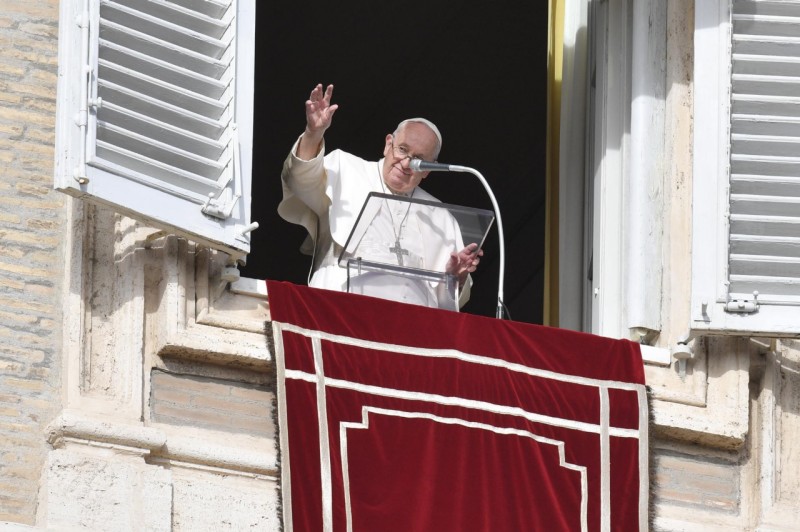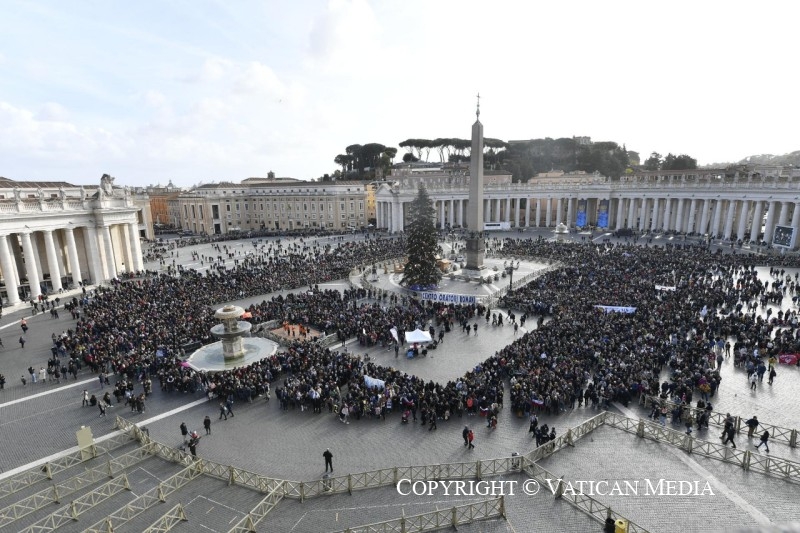Dear brothers and sisters, blessed Sunday!
The Gospel of this third Sunday of Advent speaks to us about John the Baptist who, while in prison, sends his disciples to ask Jesus: “Are you he who is to come, or shall we look for another?” (Mt 11:4). Indeed, John, hearing of Jesus’ works, is seized with doubt as to whether He is really the Messiah or not. In fact, he imagined a stern Messiah who would come and do justice with power by chastising sinners. Now, on the contrary, Jesus has words and gestures of compassion towards all; at the centre of His action is the mercy that forgives, whereby “the blind receive their sight and the lame walk, lepers are cleansed and the deaf hear, and the dead are raised up, and the poor have good news preached to them” (v. 6). It does us good, however, to look more closely at this crisis of John the Baptist, as it can tell us something important too.
The text emphasizes that John is in prison, and this, as well as being a physical place, makes us think of the inner situation he is experiencing: in prison there is darkness, there is no possibility of seeing clearly and seeing beyond it. In effect, the Baptist is no longer able to recognize Jesus as the awaited Messiah. He is assailed by doubt, and he sends the disciples to check: “Go and see if he is the Messiah or not”. It surprises us that this should happen to John, the one who had baptized Jesus in the Jordan and had indicated him to his disciples as the Lamb of God (cf. Jn 1:29). But this means that even the greatest believer goes through the tunnel of doubt. And this is not a bad thing; on the contrary, sometimes it is essential for spiritual growth: it helps us understand that God is always greater than we imagine Him to be. His works are surprising compared to our calculations; His actions are different, always, they exceed our needs and expectations; and therefore, we must never stop seeking Him and converting to His true face. A great theologian used to say that God “needs to be rediscovered in stages… sometimes believing that we are losing Him” (H. DE LUBAC, Sur les chemins de Dieu). This is what the Baptist does: in doubt, he still seeks Him, questions Him, “argues” with Him and finally rediscovers Him. John, defined by Jesus as the greatest among those born of women (cf. Mt 11:11), teaches us, in short, not to close God within our own mindsets. This is always the danger, the temptation: to make ourselves a God to our measure, a God to use. And God is something else.

Brothers and sisters, we too at times find ourselves in his situation, in an inner jail, unable to recognize the newness of the Lord, whom we perhaps hold captive in the presumption that we already know everything about Him. Dear brothers and sisters, one never knows everything about God, never! Perhaps we have in mind a powerful God who does what He wants, instead of the God of humble meekness, the God of mercy and love, who always intervenes respecting our freedom and our choices. Perhaps we even find ourselves saying to Him: “Are you really you, so humble, the God who is coming to save us?”. And something similar can happen to us with our brothers and sisters too: we have our ideas, our prejudices and we attach rigid labels to others, especially those we feel are different to us. Advent, then is a time for overturning our perspectives, for letting ourselves be surprised by God’s mercy. Astonishment: God always astonishes. We saw, not long ago, in the television programme “A Sua Immagine”, they were talking about wonder. God is always the One who stirs wonder in you. A time – Advent – in which, preparing the Nativity display for the Infant Jesus, we learn again who our Lord is; a time to leave behind certain preconceptions and prejudices about God and our brothers and sisters. Advent is a time in which, instead of thinking about gifts for ourselves, we can give words and gestures of consolation to those who are wounded, as Jesus did with the blind, the deaf and the lame.
May Our Lady take us by the hand, like a mother, may she take us by the hand in these days of preparation for Christmas, and help us recognise in the smallness of the Infant the greatness of God who is coming.

After the Angelus
Dear brothers and sisters!
Yesterday, in Barbacena in Brazil, Isabel Cristina Mrad Campos was beatified. This young woman was killed in 1982 at the age of twenty, in hatred of the faith, for having defended her dignity as a woman and the value of her chastity. May her heroic example inspire in particular the young to render generous witness of faith and adhesion to the Gospel. A round of applause for the new Blessed!
I follow with sorrow and concern the news from South Sudan about the violent clashes of the past few days. Let us pray to the Lord for peace and national reconciliation, so that the attacks may cease and that civilians may always be respected.
Today is World Mountain Day, which invites us to recognize the importance of this marvellous resource for the life of the planet and of humanity. The theme this year – “Women move mountains” – it is true, women move mountains! – reminds us of the role of women in caring for the environment and in safeguarding the traditions of mountain populations. From mountain people we learn the sense of community and of walking together.
I greet you all, here in Rome, from Italy and from many parts of the world. In particular, I greet the faithful from Barcelona, Valencia, Alicante, Beirut, Cairo, and those of Mexico and Poland. I greet the Tanzanian Catholic community in Italy; parish groups from Terni, Panzano in Chianti, Perugia, Nozza di Vestone; the Alpini Choir of Rome; and the representatives of citizens who live in the most polluted areas of Italy, in the hope of a just solution to their serious problems and the illnesses that come from this polluted environment.
And I would like to send a cordial greeting to the detainees in the “Due Palazzi” prison of Padua: I greet you affectionately!
And now I will bless the “Bambinelli”, the little statuettes of the Infant Jesus that you, dear boys and girls, have brought here and then, returning home, will place in the Nativity scene. I invite you to pray, before the creche, that the Nativity of the Lord will bring a ray of peace to children all over the world, especially those forced to live the terrible and dark days of war, this war in Ukraine that destroys many lives, so many lives, and many children. The blessing of the Bambinelli … [The Pope blesses them].
I wish you all a blessed Sunday and a good journey towards the Nativity of the Lord. Please, do not forget to pray for me. Enjoy your lunch, and arrivederci.
Source: vatican.va





